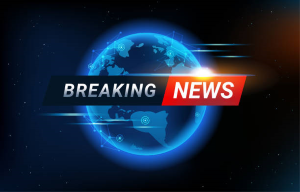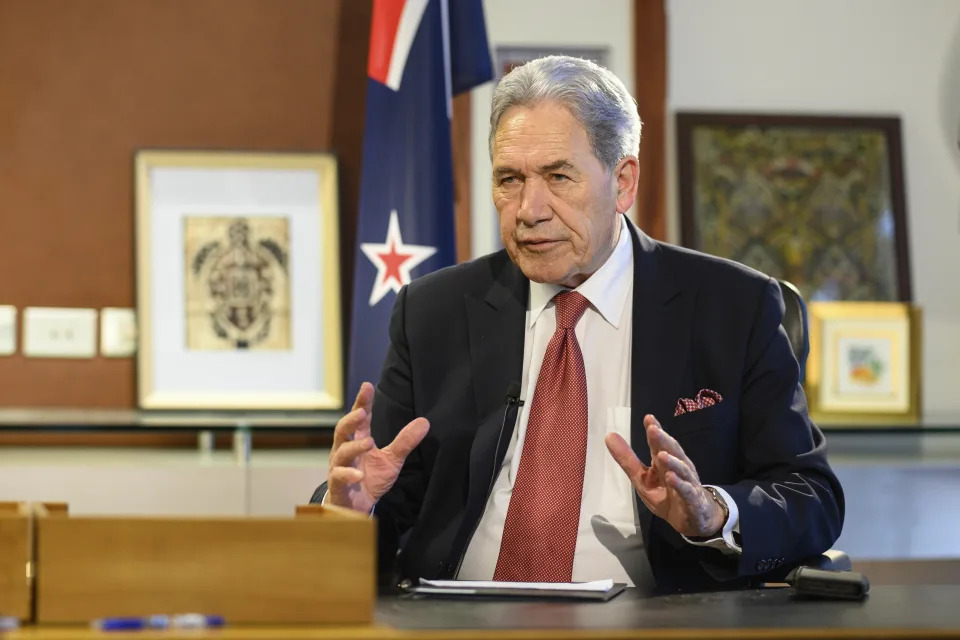New Zealand Foreign Minister Winston Peters comments during an interview with The Associated Press in his parliamentary office in the capital, Wellington, Thursday, Aug. 22, 2024.
Western nations, including the United States and New Zealand, failed to understand swiftly enough the geopolitical importance of island nations in the South Pacific, leaving a power vacuum that allowed other countries to increase their diplomatic influence, New Zealand Foreign Minister Winston Peters said.
Peters made the remark in an interview with The Associated Press in his parliamentary office in the capital, Wellington, on Thursday, ahead of an annual summit in Tonga next week of leaders of Pacific nations, including Australia and New Zealand. Crises of sovereignty, climate change and foreign influence in some of the world’s smallest and most remote nations are expected to take center stage.
The region of tropical islands and atoll nations, once overlooked by many Western governments, has become a focus of competition in recent years among the world’s largest governments for influence, resources and power. The Pacific Islands Forum has exploded in importance as a result, drawing diplomatic and civil society observers from across the globe.
Leaders of tiny Pacific nations are being courted by China with bilateral sweeteners such as infrastructure funding, export markets and security help, leading Australia and New Zealand in recent months to push for the Pacific-style consensus diplomacy of the forum. But they are facing a different landscape than before -– in part, Peters said, because of the failures of previous governments of which he was not a part.
“If you are not there as an influence, then other influences that don’t share your values might seriously fill the vacuum, and that has happened,” said Peters, 79, who is also deputy prime minister, a former foreign minister and the country’s longest-serving current lawmaker.
Peters did not name China as the subject of his remarks. But he decried what he termed the rise of “checkbook diplomacy” that has swept the Pacific -– funds with political stipulations or which must be repaid, leaving tiny island nations struggling under crushing debt -- a strategy by which China has solidified its influence in recent years.
“Like-minded countries like New Zealand will have to deal with that issue, because I know that some of these countries cannot pay it back,” he said. Small island nations in crushing debt to foreign powers give the larger country “the influence that was the design behind the loans in the first place,” Peters said.
New Zealand, with a population of 5 million — trifling on the world stage, but large compared to most Pacific Island nations, which have as few as 1,500 people -- does not challenge the independence of other Pacific countries, Peters said. “We say small states matter and their voice has the right to be respected as much as ours or any larger country,” he said.
Peters has in the past six months visited 14 of the 17 other member states of the Pacific Islands Forum. A constant connection is vital, he said, to ensure geostrategic pressures “are handled together in concert by like-minded countries.”
However, exhortations from Australia and New Zealand for the island nations to remember their part in what is often called the “Pacific family” have at times irked leaders seeking to forge their own paths -– often with China’s help. This week, Kiribati announced it was suspending diplomatic visits for the rest of the year, citing its ongoing elections -– but provoking questions from some analysts about whether its closer ties with Beijing, and increasingly aloof relations with Australia, were partly responsible.
Peter didn't comment on what he believed had prompted the move. But he said the region's “DNA connection” — the Polynesian navigators who traveled through the Pacific thousands of years ago before finally reaching New Zealand -– would prevail.
Peters said his travels this year showed him that the citizens of Pacific islands “have not been seduced” by the bilateral wooing of some leaders.
“Go and ask the ordinary people in the hamlets, the villages, the small towns and hills of the Pacific and they’ll tell you what they prefer,” he said.
One focus of this year's forum is ongoing unrest in New Caledonia, a French territory where violence between pro-independence residents and French-backed authorities flared in May, killing nine civilians and two gendarmes.
The Indigenous Kanak people have long sought to break free from France, which first colonized the Pacific archipelago in 1853 and granted citizenship to all Kanaks in 1957. The latest unrest exploded over attempts by the French government to amend its own constitution, expanding voting lists in New Caledonia and granting more French residents the right to vote than before.
Kanaks feared that would further marginalize them and denounced a final vote on the matter in 2021 as illegitimate -– which France has vehemently rejected. The matter threatens to boil over at the forum.
Peters has not stated a view, although he expressed the need for “major economies to stay engaged in the Pacific,” underscoring New Zealand's and Australia's fears that France giving up New Caledonia would open a new vacuum and further threaten an economy that until recently was one of the Pacific’s most successful.
“There are other models of what can work,” he said. “How about exploring one which keeps friends together?”
He was scathing, however, of Paris’ claim that the final vote in New Caledonia was legitimate.
“I did have to remind the ambassador to New Caledonia from France that some of us have been around thousands of years before she ever got near this place, so would she just kindly remember that,” Peters said.
He had similar sentiments for the U.S., which invited Pacific leaders to a White House summit for the first time in 2022 and had, he said, underestimated the region before that.
Peters said he had advised “Eurocentric” American officials to “please get engaged and try to turn up,” although he added, “But not with the uniform on.”
As the leaders converge on Tonga this weekend to confront the existential challenges facing them, such as climate change, Peters will invoke the old friendships of the Pacific family, while urging something more.
“Everything now is an inflection point,” he said. “More urgency, more action and more unction.”
AfriPrime App link: FREE to download...
https://www.amazon.com/Africircle-AfriPrime/dp/B0D2M3F2JT
State Department No. 2 Campbell to represent US at Pacific Islands summit in Tonga
U.S. Deputy Secretary of State Kurt Campbell will represent the United States at a summit of the 18-nation Pacific Islands Forum in Tonga next week and will also visit Vanuatu and New Zealand, the State Department said, as Washington seeks to boost ties with a region where it is in increasing competition with China.
Campbell, a key architect of U.S. Indo-Pacific policy, will be in the Tongan capital Nuku'alofa on Aug. 28 for the 53rd Pacific Islands Forum Leaders Meeting, and engage Pacific Island leaders on the margins to discuss the U.S. Pacific Partnership Strategy launched in 2022, the department said in a statement.
He will then visit Vanuatu to dedicate the new U.S. embassy there, which opened last month. He will also highlight a U.S. Peace Corps project at a hospital and a repatriation of Vanuatu cultural artifacts, the statement said.
Campbell will conclude his regional trip with a visit to New Zealand, where he will co-chair a U.S.-New Zealand Strategic Dialogue meeting in Auckland on Aug. 30 and launch an inaugural High-Level Technology Dialogue.
Campbell is viewed as an intellectual author of then-President Barack Obama's "pivot to Asia" strategy aimed at rebalancing of U.S. diplomatic and military resources to the region.
He has frequently stressed the need to step up engagement with the Pacific region, warning that China, Washington's main strategic competitor, is waiting in the wings to take advantage if it does not do so.
U.S. President Joe Biden has hosted two summits with Pacific Island leaders, but disappointed them last year when he canceled a trip to meet them in their region due to debt ceiling negotiations in Washington.
In February, the United States cautioned Pacific island nations against accepting assistance from Chinese security forces following a Reuters report that Chinese police were working in Kiribati, a remote atoll nation near Hawaii.
Chinese police have deployed in the Solomon Islands since 2022 after a secret security pact criticized by the United States and Australia as undermining regional stability. Concerns have been raised also over workers in military uniforms in Vanuatu after a Chinese company began logging there.
The leaders of Vanuatu and Solomon Islands visited China in July.
AfriPrime App link: FREE to download...
https://www.amazon.com/Africircle-AfriPrime/dp/B0D2M3F2JT
Climate change, security take top billing as Pacific Island leaders prepare to meet
Climate change and security will dominate discussions at next week's meeting of Pacific Islands leaders in Tonga as China and the United States jostle for influence in the region.
The chairman of the Pacific Islands Forum, Cook Islands Prime Minister Mark Brown, told foreign ministers from the 18 member nations this month "regional solidarity amidst the ever-increasing geostrategic interest, navigating the ongoing climate crisis and managing emerging challenges" are top priorities.
United Nations Secretary General António Guterres will also travel to Tonga, which has a population of 100,000 spread across 36 islands and is reliant on overseas aid, to highlight the need for greater climate change assistance.
Slow economic growth, rising costs for imported basic goods and the severe impact of climate-induced disasters were raised by economic ministers in the lead up to the meeting. The decline of international banking services across the region will also be discussed.
Civil unrest between indigenous Kanaks and French loyalists in the French territory of New Caledonia, a forum member, is among several challenging security issues for leaders.
They will also consider a proposal to boost training of Pacific Islands police to enable forum members to assist each other with security in a crisis, reducing the need to turn to help from countries outside the region such as China.
Australia, the largest member of the forum, has backed the proposal and will fund a regional police training centre in Papua New Guinea.
"It is politically sensitive because everyone is well aware of the strategic implications," said Mihai Sora, director of the Pacific Islands Program at the Lowy Institute think tank in Australia.
It will be important the policing programme is seen as responding to Pacific Islands priorities and not just cementing top aid donor Australia's role as the major security partner, he added.
Until recently, China has been a major infrastructure lender in the region and is now seeking a greater role in the military, policing, digital connectivity and media.
Chinese police operate in Solomon Islands and Kiribati, and Beijing hosted visits by the leaders of Fiji, Vanuatu and Solomon Islands in the weeks before the forum meeting, highlighting its ability to provide development assistance, and its security goals.
U.S. Deputy Secretary of State Kurt Campbell will travel to Tonga to meet with the forum leaders, the U.S. State Department said on Friday.
The U.S. is not a forum member, but leaders will decide on an application by the U.S. Pacific territories of Guam and American Samoa to join as associate members, without voting rights.
"These are American territories, so that will increase the U.S. access, and potentially its ability to influence or shape regional discussions," Sora said.
Highlighting the challenges to adopting a unified approach, forum member Kiribati announced in a Facebook statement on Friday it was closing its door to foreign diplomatic visits until 2025.
The remote nation's pro-China president Taneti Maamau regained his parliament seat in a national election this month, but still faces a direct vote for president later in the year.
Three forum members have diplomatic ties with Taiwan, which China views as its own territory, after Nauru switched its allegiance to Beijing this year.
AfriPrime App link: FREE to download...




